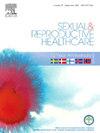Women’s experiences of participating in a digital continuity of care model designed for fear of birth in a rural setting
IF 1.7
3区 医学
Q3 PUBLIC, ENVIRONMENTAL & OCCUPATIONAL HEALTH
引用次数: 0
Abstract
Background
Midwifery continuity models are highly recommended. Women with fear of birth living in rural areas might have difficulties accessing such care. Technology can play a role in enhancing contact with midwives during pregnancy and childbirth for these women.
Objective
The aim of this study was to elucidate women’s experiences of participating in a digital continuity of care model designed for pregnant women with fear of birth.
Methods
A qualitative interview design, employing interviews with 15 women participating in a midwifery continuity project directed towards women with fear of birth. The participants used e-health tools for communication with midwives during their pregnancy and childbirth. Reflexive thematic analysis was used.
Results
The analysis resulted in an overarching theme: ‘A digital continuity model of midwifery care for women with fear of birth in a rural area is attractive’. The model created positive outcomes in terms of sustainability and use of resources. The women reported enhanced autonomy and reduced stress. Continuity of care fostered confidence and security throughout childbirth for the women, supported by a strong relationship with their midwives. The individualised care, which addressed mental health challenges and fears stemming from past childbirth experiences, led to positive outcomes.
Conclusion
A model with continuity using digital e-health could be a solution to meet women’s needs in rural areas during childbirth, who suffer from fear of birth or have mental health problems. Care models need to be tailored to regional conditions, considering factors such as midwifery availability and geographical challenges.
妇女参与数字连续护理模式的经验,这种模式是为了避免在农村环境中分娩而设计的
背景:强烈推荐助产连续性模型。生活在农村地区的害怕生育的妇女可能难以获得这种护理。技术可以在这些妇女怀孕和分娩期间加强与助产士的联系方面发挥作用。目的本研究的目的是阐明妇女参与数字连续护理模式设计的孕妇分娩恐惧。方法采用定性访谈设计,对参与接生连续性项目的15名妇女进行访谈,该项目针对的是害怕生育的妇女。参与者在怀孕和分娩期间使用电子卫生工具与助产士沟通。采用反身性主题分析。该分析得出了一个总体主题:“对农村地区害怕分娩的妇女来说,助产护理的数字连续性模式很有吸引力。”该模式在可持续性和资源利用方面产生了积极成果。这些女性报告说,她们的自主性增强了,压力也减轻了。在与助产士的牢固关系的支持下,持续的护理培养了妇女在分娩过程中的信心和安全感。个性化护理解决了过去分娩经历带来的心理健康挑战和恐惧,产生了积极的结果。结论使用数字电子保健的连续性模式可以满足农村地区妇女分娩时的需求,这些妇女害怕分娩或有精神健康问题。护理模式需要根据地区情况进行调整,同时考虑到助产服务的可获得性和地理挑战等因素。
本文章由计算机程序翻译,如有差异,请以英文原文为准。
求助全文
约1分钟内获得全文
求助全文
来源期刊

Sexual & Reproductive Healthcare
PUBLIC, ENVIRONMENTAL & OCCUPATIONAL HEALTH-
CiteScore
2.70
自引率
5.60%
发文量
73
审稿时长
45 days
 求助内容:
求助内容: 应助结果提醒方式:
应助结果提醒方式:


